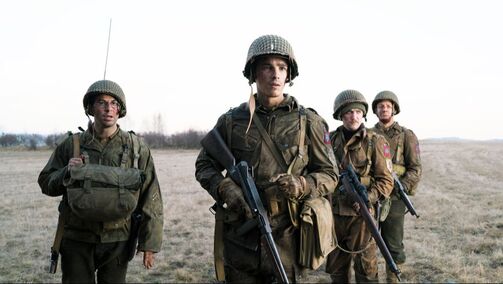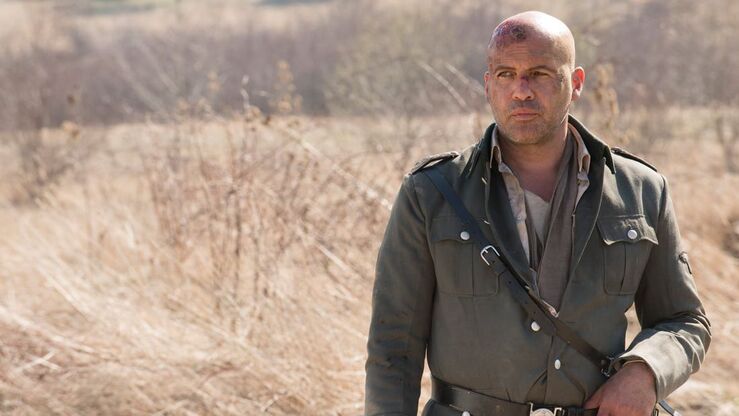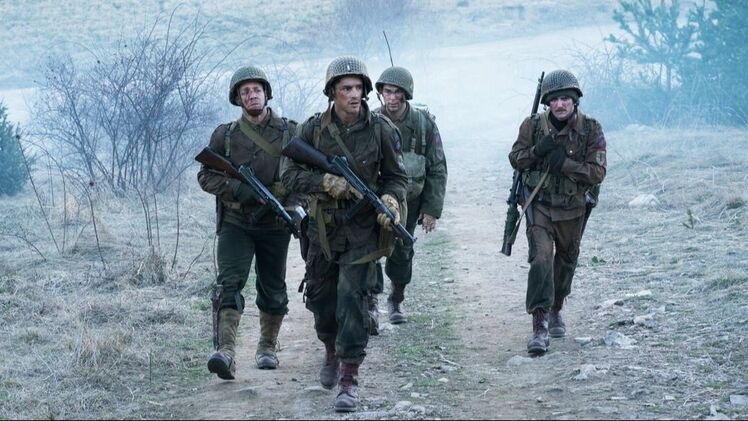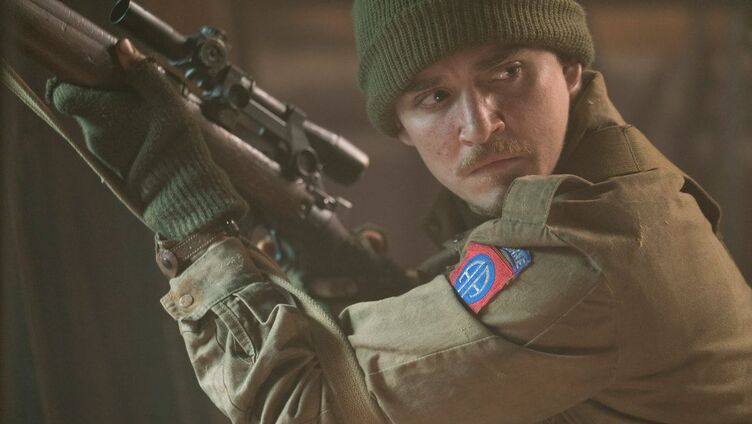 Writer/director Eric Bress is tired of seeing the same old haunted house movie... ...That's why, after directing The Butterfly Effect with co-director J. Mackye Gruber in 2004, Bress is finally returning behind the camera as a feature director again with Ghosts of War, a film which takes place during World War II and pits battle-hardened soldiers against a terrifying new enemy when they are assigned to watch over an isolated house with a dark history. I had the pleasure of sitting down with Eric to discuss his new film. We got into some of his unmade projects, the difficulty of pitching unique concepts, the horror of war, and the ending he would've preferred for The Butterfly Effect now that it's been a few years. "I was so bored of seeing the same family goes up against the ghosts in a haunted house, and I was like, wouldn’t it be cool to see what happens if battle-hardened soldiers who kill people without even losing sleep over it go to a haunted house and are outgunned and outmanned by forces they can’t even explain?" Killer Horror Critic: This is your first time getting behind the camera for a feature since The Butterfly Effect, so what was it about Ghosts of War that drew you to this topic and wanting this to be your next film? Eric Bress: Well let’s get to the authentic answer to that question…it wasn’t for lack of trying for sixteen years that I didn’t. KHC: I imagine. EB: I made some strange choices after ‘Butterfly Effect’ was the number one movie in seventeen countries. I decided to go off into the world of television, thinking I’m in the club, I’ve paid the dues, I can always go back to feature films. I love television, its jolly good fun. But it gets tough. It gets tough. And the industry was changing around me during the time and all of a sudden studios are not cannibalizing each other as much anymore and they’re releasing fewer films so the entire landscape changed a bit. ‘Ghosts of War’ was one of those efforts where again I’m swinging for the fences way outside the box. You’ve seen it, this movie is not something the studio would necessarily sign off on in the way we just got lucky with New Line Cinema singing off on ‘The Butterfly Effect’. So, this was a tricky thing where most horror movies are like two million and down and well we have something that has some effects, and it has war, and it has action. It’s not just a family in a house walking down creepy hallways. KHC: Right, very different. EB: So, it took a lot and most of my material is like that. It’s genre bending and it doesn’t put itself in an easy box for executives or any producers for that matter. The challenge was to come up with something that was fairly original, had some twists and turns in it and gets people so excited about it that they’re willing to do the hard work and find the money. Get the thing greenlit. Get the cast and make it happen because normally it’s much simpler if I were to just cave and do a family moves into a spooky house. KHC: I actually think that’s what’s great about your work. I saw The Butterfly Effect when it came out in theaters and that was very different at the time, and like you’re saying, Ghosts of War is a very different ghost story. But you’re right, it is frustrating that you kind of have to…it’s a little more difficult to sell it to producers because they always want the simple, in the box kind of thing. EB: I went in to pitch a….I’m not saying it was a good idea…I went in to pitch a story that was like, you go to the haunted house and the ‘Amityville Horror’ ghost says get out, and you do, but then it follows you, and torments you so much that some horrible crime happens and you wind up in jail and it’s still following you. And now throughout the horrors of jail, you’re still being haunted and it’s just shit you’ve never seen before. And the studio executive who may have been right just says, “yeah, I…haunted houses have to be with families because a house is where you’re safe. It’s where you feel the safest and it has to be with families in a nice house.” And that’s it. And I’m like, wow. I felt punch drunk leaving that meeting. KHC: I know, it’s like come on, Mr. Studio Executive, just imagine how much scarier it would be if you’re in a scary place like a prison and you still have horrible things happening! EB: Right! I mean can’t you layer it a little bit? But I guess maybe they know there’s only one kind. Maybe that’s just too much noise. And to hear that piano sound beautiful, you gotta get the horns away and the bongo drums. Maybe they know something I don’t, but I just get bored with what’s in the market place. I only write what I want to see, so it’s always going to be something a little different than that. I was so bored of seeing the same family goes up against the ghosts in a haunted house, and I was like, wouldn’t it be cool to see what happens if battle-hardened soldiers who kill people without even losing sleep over it go to a haunted house and are outgunned and outmanned by forces they can’t even explain? Shit, I don’t know what would happen, but I want to see that one. KHC: And that’s what people really want to. You hear horror fans talk about it all the time. We want the more unique stuff. We want to see something different. Is that idea about the prison something that you’re still hoping to do? EB: You know, I would say no because of the cost factor. As a filmmaker, you kinda have to bend and be a little more contained, especially now with quarantine, it’s like wow, the contained thriller is going to be where it’s at for a while. I don’t know how they’re going to make ‘Captain Marvel 3’. KHC: All green screen. [LAUGHS] EB: Yeah, all green screen and everyone wearing masks. Yeah, there have definitely been a lot of movies, a number of them though haven’t even been horror. I think that’s the thing. It’s not oh, I’ve been pigeonholed. It’s more just that sometimes, I write things that are more like ‘Forrest Gump’. There are actually scripts I’ve written that are so uplifting, and hopeful and funny, but they’re at a price point where…You know, I do them because I love writing them, and I don’t realize until I write “fade to black”, dude, what did you just waste your time on that for? No one’s going to make a forty-million-dollar movie that stars a twenty-three-year-old boy! Leonardo DiCaprio is too old. You can’t greenlight forty-million dollars off of an age group where no one’s that famous. I mean ‘Ready Player One’, I don’t know, there are only so many of those that are going to come out. "It was all made to make you think that you were losing your mind and that the characters themselves were losing their mind the way they do in ‘The Shining’. I think Kubrick once said, “it’s about a family going mad together”. I wanted to get that feeling across with this one." KHC: Yeah, that’s a little difficult these days. That’s interesting that a lot of your work that you’ve been writing is a little bit more uplifting stuff because something between The Butterfly Effect and Ghosts of War that I’ve noticed is that these are both films that deal with heavy trauma and PTSD, so is there something about that subject matter that draws you to those stories? EB: Well in this case, I started writing it right after the announcement came out that modern veterans were committing suicide at a rate of twenty-two a day for lack of treatment and I was thinking about that kind of war trauma. And I’d already thought horror and war really should be mashed up in a genre. I grew up listening to George Carlin as a small child hearing those filthy words and he had this great bit that in World War I they called it “shell shock” and in World War II they softened the language to “battle fatigue”. By Vietnam it was “operational exhaustion” and now its “PTSD”. I thought well, the condition is timeless. You’ve seen the film. I wanted the audience to be able to sort of feel that, seeing things out of the corner of your eyes…to sort of live in that world of what might it be like to suffer from this insidious condition without being preachy or on the nose of what you’re talking about. It sort of became an underlying metaphor or undercurrent of the whole thing. KHC: Is something like Ghosts of War a little more difficult for you to write since you tend to not focus on darker material as much? EB: It really was enjoyable to write. I think the first draft had a bunch of weirder crap in it. Like one of the characters gets his arms blown off, and at some point in the first script there were arms that would walk around like Thing from ‘The Addams Family’ and freak people out. KHC: Oh wow. EB: It was all made to make you think that you were losing your mind and that the characters themselves were losing their mind the way they do in ‘The Shining’. I think Kubrick once said, “it’s about a family going mad together”. I wanted to get that feeling across with this one. But it’s always enjoyable to write, no matter how dark it is. I rewatched ‘Butterfly Effect’ recently and I was like, what were you thinking? This movie just gets dark and then keeps hitting you. Damn! KHC: It was an experience for sure. EB: I’ll tell you, these days, and I think it’s a function of time and age, I probably would’ve gone lighter with the ending of it. Like okay, I have put you through such a ringer, that I want you to cry tears of joy at the end, not just leave you thought provoked. I feel like you’ve earned the right to feel wonderful from going through this horror. KHC: Is there an alternate ending you wish you would’ve done with The Butterfly Effect? EB: Yes. Right now, I think having just seen it, this is what we called the happy sappy version on the Blu-ray. Our two leads Ashton Kutcher and Amy Smart meet up randomly and there’s a connection between them and they walk off into the sunset together. And it was shot. And we fought against anything like it being in there. It was the happy sappy crap candy coated bullshit ending, and now I’m like hey man, probably would’ve made ten million dollars more! [LAUGHS] KHC: I guess you never know, but at least it was successful anyway right? EB: Yep. Yep I’ll tell you, these days, and I think it’s a function of time and age, I probably would’ve gone lighter with the ending of it ('The Butterfly Effect'). Like okay, I have put you through such a ringer, that I want you to cry tears of joy at the end, not just leave you thought provoked. I feel like you’ve earned the right to feel wonderful from going through this horror. KHC: Back to Ghosts of War, we ultimately discover some pretty good reasons for why the film takes place during World War II, but is there anything about that particular war that made you want to set this story during that time period? Is there something about it that you think goes well with horror? EB: Yeah. To me, that war is just to my mind…it’s the good war. It was clear evil. Clear bad. There’s no stain that more recent wars have to them. There’s no real controversy to it. And it’s so nostalgic that it separates any personal shit going on in your life with what happened a long time ago in 1944. I didn’t want it to provoke baggage as you’re watching the movie. I didn’t want it to be political. I wanted it to be distilled and pure so that we’re just watching the ‘Saving Private Ryan’ gang happen upon a haunted house mission and find their heads above water. That’s why World War II pulled me more than World War I or anything else. KHC: Right, you wanted to have that very specific and clear good vs evil element. EB: Yeah. KHC: Do you have a favorite World War II horror film? EB: God, you know, I enjoyed ‘Overlord’ except for the fact that they were casting it as we were wrapping production. And because it was the J.J. Abrams fast track machine, I was like holy shit, this might beat us to the box office and everyone’s going to think I ripped it off even though it’s so top secret. It’s a J.J. Abrams movie, we can’t find out what it’s about, and my actors are being asked to be in it. KHC: Oh god. EB: But when I finally saw the film it was like yeah, totally different genre. It’s an action movie. I don’t feel threatened by it. KHC: Right, so just a wave of relief coming over you like thank god. EB: Yeah. Exactly. KHC: Yeah, luckily they’re both very different. Maybe they’ll make a nice opposites sort of double feature someday. EB: I’m all for it! KHC: All right, well it’s been a pleasure chatting with you Eric. EB: Thanks man. Appreciate it. KHC: Take care and have a great day. EB: Same to you, it’s been a pleasure chatting with you (Ghosts of War is now available on VOD from Vertical Entertainment) By Matt Konopka
0 Comments
Leave a Reply. |
Archives
March 2023
|



 RSS Feed
RSS Feed